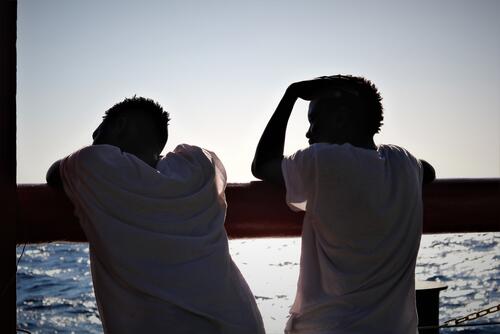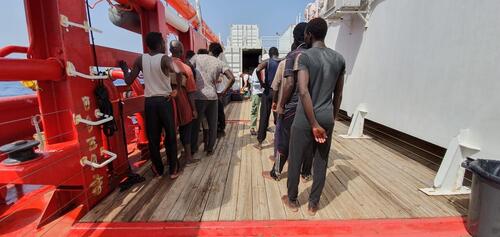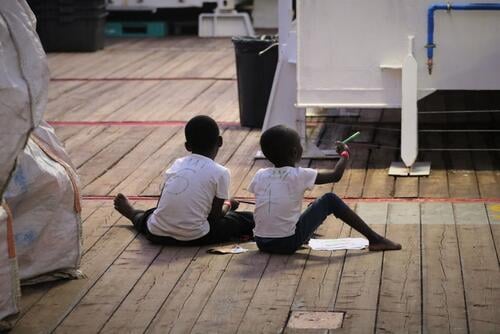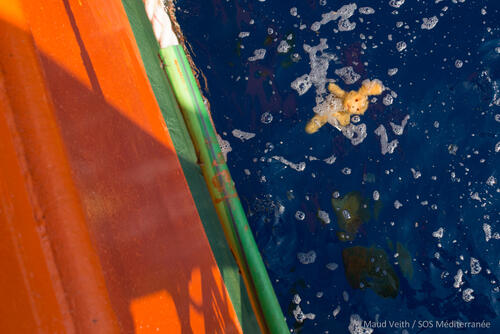Luca, an MSF doctor on board the search and rescue ship Ocean Viking, recounts the story told to him by a 20-year-old Libyan man rescued in the Central Mediterranean with shrapnel in his torso.
Khalil was saved from a rubber boat on Monday 12 August 2019. I was there when one of the dinghy’s inflated tubes burst and people fell into the water. I assisted the rescue team as they pulled him and his fellow travellers out of the sea. He was one of 105 people saved from the Central Mediterranean by the Ocean Viking that day.
Once we were back on board the search and rescue ship, he came to my attention, complaining of constant pain in his abdomen. After a quick examination, I identified the culprit: shrapnel.
Shrapnel from grenades or bullets is a common finding in war-wounded patients or those coming from a conflict zone, but it’s always confronting to see this type of traumatic injury in someone so young – just 20 years of age.
Sometimes the metal can penetrate deeply, injuring the organs. In those situations, the patient requires major surgery.
In Khalil’s case, the shrapnel was lodged 1.5 cm under the skin. I embarked on removing the shard from the left side of his body as it was causing him significant discomfort and he was at risk of infection.
As I worked, he told me his story. This is what he said:
It had never been his plan to make this crossing by sea. He was a taxi driver in Libya.
A few months ago, as he drove through a checkpoint, some armed men stopped his car. They asked to see his phone and went through his pictures. In one of the photos, you could see he was carrying a gun. “But that is normal in Libya these days,” he told me. “There is a war happening – everybody carries a gun now.”
I can’t begin to imagine how I would feel in his position: forced to step into the darkness of the sea, to risk my life in the hope of a better oneLuca, MSF doctor on board the Ocean Viking
While on the ship we are often focused on the situation in Libya for refugees and migrants, the reality there is extremely concerning for all civilians.
Since fighting erupted in Tripoli in April this year, hundreds have been killed – mostly Libyans themselves – and tens of thousands have been displaced as indiscriminate shelling, gunfire, and airstrikes continue in densely populated areas of the city.
The soldiers accused him of being part of a militia or armed group. They took his car, his money and his documents, before throwing him into prison.
He was detained for three months. Every day he was interrogated and beaten – which I could recognise from the scars on his body.
The people held captive there were treated very badly, sometimes going days without food or water. Tension mounted as people became increasingly distressed. One day, the tension boiled over and there was a riot.
Khalil described how people started running, trying to escape. As he attempted to flee, one of the guards shot at him with a Kalashnikov. He was lucky it wasn’t a direct hit.
Around him, he could see people being shot and falling down. He didn’t know if they died because, at that point, he was running for his life. He just kept running and running, despite the wound and the bleeding.
Over the following days, his main concern was to find safety. He was worried that he would be found by a militia or armed group. His mother told him it wasn’t safe to be at home. He kept moving from place to place.
When he eventually arrived in Tripoli, he called his cousin, who was living there for help. The cousin said he was in turkina or ‘in the corner’ – which is what people call the area where they gather before being pushed into boats to cross the Central Mediterranean.
This was how he came to leave Libya, on a rubber boat, relieved to leave behind a war-torn country where there was no safe place for him. I can’t begin to imagine how I would feel in his position: forced to step into the darkness of the sea, to risk my life in the hope of a better one.”
Dr Luca Pigozzi, medical doctor on board the Ocean Viking
“It’s been now 13 days that 356 vulnerable people are stranded on board Ocean Viking. Every day we see the situation deteriorate. There are people on board with medical conditions that could turn critical in an instant and could require an evacuation.
In almost two weeks, I have seen victims of sexual violence and treated people who suffered brutal beatings, electrocution, torture including by melting plastic, and also war-related wounds. A third of my patients are children under the age of 18. They all have experienced nightmarish journeys before they have been rescued.
As each day passes I can see a rapid and concerning deterioration in people’s mental state. They are petrified they will be taken back to Libya where they have been exposed to horrendous abuses and arbitrary detention.
Many had attempted to flee Libya more times but have been intercepted by the EU-supported Libyan Coast Guard, and forced back to detention. Some are survivors of shipwrecks or bombings. They all deserve safety. As a doctor, I cannot accept their unnecessary drawn out suffering.
Why are ethics and humanity taken hostage by politicians who voluntarily leave them stranded at sea, depriving them again of their basic rights and dignity?
How much more trauma will European leaders impose on these people until a humane solution is found? What must happen before they react?
There must be an urgent intervention now. I implore European States to find their humanity and put an end to this disgrace. All 356 people on board must be allowed to disembark in a place of safety now.”






